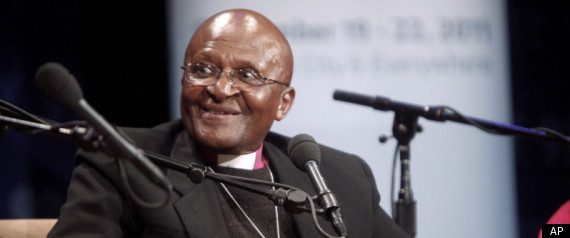 Archbishop Desmond Tutu is one of eight Nobel Peace Prize winners who have signed a letter asking Prime Minister Stephen Harper to do what he can to stop the growth of Alberta's oilsands.
Archbishop Desmond Tutu is one of eight Nobel Peace Prize winners who have signed a letter asking Prime Minister Stephen Harper to do what he can to stop the growth of Alberta's oilsands.The letter comes three weeks after several peace prize laureates wrote a letter to United States President Barack Obama asking him to block the proposed Keystone XL Pipeline (TSX:TRP), which would increase oilsands exports to the United States.
"Just as we called on President Obama to reject the pipeline, we are calling on you to use your power to halt the expansion of the tarsands — and ensure that Canada moves towards a clean energy future," the letter says.
The laureates point out that Harper has called climate change one of humanity's biggest challenges. They call on him to back his words with action by using federal powers to halt further expansion of the oilsands.
"It would be wrong for humanity to choose a path that drives hundreds of thousands of species to extinction," the letter says. "It would be wrong for a rich minority of the world’s inhabitants to create a problem like climate change and then refuse to do its fair share to fix it.
"And it would be wrong for this generation to make this planet uninhabitable when we know that our children and grandchildren will be forced to deal with the consequences."
The letter was co-ordinated through and released by the Nobel Women's Initiative, a group that co-ordinates the activities of the six living female winners of the peace prize.
Jody Williams, an American who won her prize in 1997 for her work toward an international treaty banning land mines, said it makes sense for the group to address environmental causes.
"Part of conflict is the result of the ruination of the environment," she said, pointing out that the fighting in the Sudan's Darfur region was partly the result of desertification.
"Our security is tied to the environment."
Williams said the group's interest in the oilsands is long-standing. She said she appeared at the University of Alberta several years ago to speak out against the oilsands.
"The tarsands is something that has personally bothered me for some time," she said. "It's not something new."
Travis Davies, a spokesman for the Canadian Association of Petroleum Producers, said the oilsands are a needed energy source that is constantly reducing its environmental impact.
"We all want more renewable energy options," he said.
"(But) every credible forecast cites large increases in energy demand over the foreseeable future. We will need more of all energy sources to meet this need.
"We will continue to improve our environmental performance."
The letter says Canada is well-placed to be a leader in fighting climate change. It praises Ontario legislation that aims to phase out high-carbon, coal-fired power generation, calling it "probably the single most effective piece of legislation promoting renewable energy in North America."
Besides Tutu and Williams, the signatories include Mairead Maguire, Betty Williams, Adolfo Pérez Esquivel, Rigoberta Menchú Tum, José Ramos-Horta, and Shirin Ebadi.
They are renowned for their work in promoting peace and human rights in South Africa, East Timor, Northern Ireland, Argentina, Iran and Guatemala, as well as for causes such as banning land mines.
The letter to Harper is signed by almost all the same people who signed the one to Obama, except for the Dalai Lama. Williams said the group couldn't get in touch with him in time.
Williams said she doesn't expect a response.
"I don't really think they care," she said.
Origin
Source: Huffington
No comments:
Post a Comment